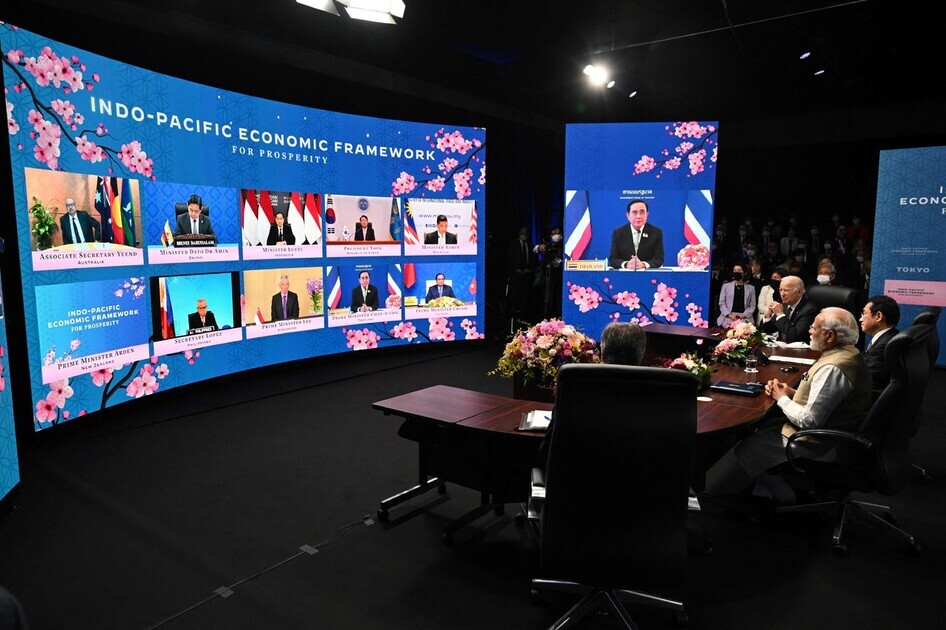hankyoreh
Links to other country sites 다른 나라 사이트 링크
[Editorial] Is Yoon prepared for the consequences of cold-shouldering China?

As South Korea formalizes its economic security alliance with the US and participates in the US-led Indo-Pacific Economic Framework (IPEF), its trade policy stance is coming to a major turning point.
The presidential office explains this as a ramping up of the change from the existing framework of the US being Korea’s main security ally and China being its strongest economic partner to a framework of relying on the US for security and working with the world on economic matters. However, this is misleading. It would not be an exaggeration to say that the Yoon administration perceives the US as Korea’s most important partner in both the fields of security and the economy.
It goes without saying that the Korean economy is highly dependent on China and market diversification is necessary. However, sudden changes without the necessary preparation will inevitably come with costs.
China accounts for about one-quarter of Korea’s total imports and exports. In particular, an interdependent division of labor structure is currently held tightly in place with intermediate goods. Intermediate goods account for 64% of Korea’s imports from China and 80% of exports.
In addition, of the items Korea considers vulnerable to supply chain disruptions — which account for more than 70% of imports from specific countries among all imported items in Korea — 2,434 are sourced from China, 601 from the US, and 565 from Japan. China’s share is overwhelmingly larger than that of other countries.
As was seen with the urea crisis late last year, Korean industries can end up paralyzed without China. The same goes for high-tech industries. Lest we forget 60% of Korea's semiconductor exports go to China.
The IPEF is a grand plan by the US to artificially reorganize the division of labor in high-tech industries mainly in Northeast Asian countries such as Korea, China, Japan, and Taiwan. The goal is to have Southeast Asian countries and India take over the role of China. If the US’ plan becomes a reality, it’s only a matter of time before Korean industry and trade are dealt a big shock.
Companies that seize opportunities in the transition process can reap the benefits, but those that do not adapt properly will suffer damage.
Regarding Korea’s involvement in the IPEF, President Yoon Suk-yeol told CNN in an interview on Monday, “Even if we strengthen our alliances with the United States in security and technology, it does not mean that we think our economic cooperation with China is unimportant.”
Yoon also said that, since both South Korea and China depend on their mutual cooperation, he does “not believe it is reasonable for China to be overly sensitive about this matter,” revealing the very easy-going way of thinking of the president.
The IPEF is based on the US intention to exclude China from the global supply chain. A plan is needed that puts the characteristics of the Korean industry and the ecosystem into perspective. For Korea, which heavily depends on trade to keep its economy strong, fully excluding either the US or China is far too risky.
Please direct questions or comments to [english@hani.co.kr]

Editorial・opinion
![[Column] Park Geun-hye déjà vu in Yoon Suk-yeol [Column] Park Geun-hye déjà vu in Yoon Suk-yeol](https://flexible.img.hani.co.kr/flexible/normal/500/300/imgdb/original/2024/0424/651713945113788.jpg) [Column] Park Geun-hye déjà vu in Yoon Suk-yeol
[Column] Park Geun-hye déjà vu in Yoon Suk-yeol![[Editorial] New weight of N. Korea’s nuclear threats makes dialogue all the more urgent [Editorial] New weight of N. Korea’s nuclear threats makes dialogue all the more urgent](https://flexible.img.hani.co.kr/flexible/normal/500/300/imgdb/original/2024/0424/7317139454662664.jpg) [Editorial] New weight of N. Korea’s nuclear threats makes dialogue all the more urgent
[Editorial] New weight of N. Korea’s nuclear threats makes dialogue all the more urgent- [Guest essay] The real reason Korea’s new right wants to dub Rhee a founding father
- [Column] ‘Choson’: Is it time we start referring to N. Korea in its own terms?
- [Editorial] Japan’s rewriting of history with Korea has gone too far
- [Column] The president’s questionable capacity for dialogue
- [Column] Are chaebol firms just pizza pies for families to divvy up as they please?
- [Column] Has Korea, too, crossed the Rubicon on China?
- [Correspondent’s column] In Japan’s alliance with US, echoes of its past alliances with UK
- [Editorial] Does Yoon think the Korean public is wrong?
Most viewed articles
- 1‘We must say no’: Seoul defense chief on Korean, USFK involvement in hypothetical Taiwan crisis
- 2N. Korean delegation’s trip to Iran shows how Pyongyang is leveraging ties with Moscow
- 3Amnesty notes ‘erosion’ of freedom of expression in Korea in annual human rights report
- 4[Column] Park Geun-hye déjà vu in Yoon Suk-yeol
- 5‘Weddingflation’ breaks the bank for Korean couples-to-be
- 6[Reportage] On US campuses, student risk arrest as they call for divestment from Israel
- 7[Editorial] New weight of N. Korea’s nuclear threats makes dialogue all the more urgent
- 8Why Korea shouldn’t welcome Japan’s newly beefed up defense cooperation with US
- 9[Guest essay] The real reason Korea’s new right wants to dub Rhee a founding father
- 10Will NewJeans end up collateral damage in internal feud at K-pop juggernaut Hybe?